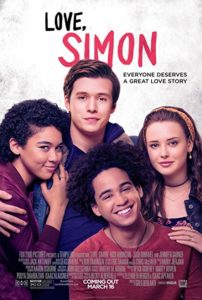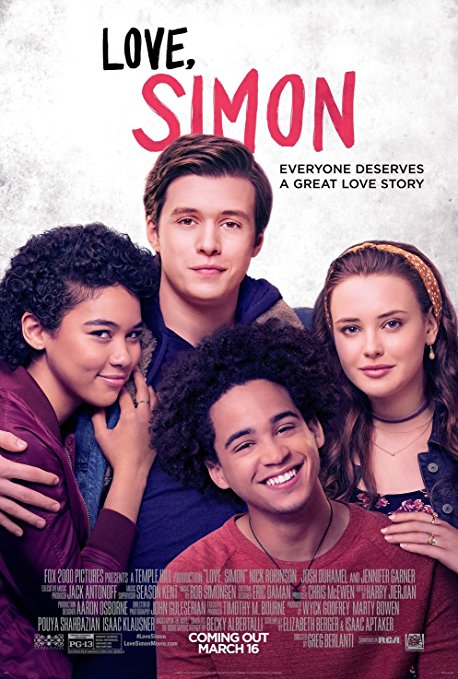I’m hesitant to call this article a review of Love, Simon, primarily because reviews are supposed to be impartial examinations of a work’s merits or lack thereof — writings in which personal experiences and opinions typically take a backseat to objectivity. But as one can probably infer from the film’s reputation as “the gay movie,” Love, Simon is a film that begs to uproot its genre’s — and greater societal — conventions. Because of how deeply poignant and provocative this movie is, it feels unjust to not address some sort of personal experience in its review.

I initially doubted Love, Simon’s ability to be a teenage romcom flick and a gay movie rolled up into one cohesive package. While pre-release hype heralded the film as a step towards the LGBTQ+ community’s monumental push into mainstream media, I was skeptical that Love, Simon was entering a genre so often mocked for its infamously shallow nature. Part of me worried that Love, Simon would be undermined just for being a teenage romcom, but I was definitely also concerned that it would be as shallow as the plethora of films that already dot the teenage romcom landscape.
No, Love, Simon is not the next masterpiece to join the ranks of great cinematic classics like The Godfather or Casablanca. I’m not expecting it to win many awards or even gain massive popularity beyond a cult following. And when handling a topic as taboo as gayness, it’s bound to stumble somewhere. But Love, Simon never set out to be a film with overwhelmingly dramatic storylines or groundbreaking technical specs; instead, its carefully-crafted atmosphere, particularly in its character relationships, and meticulous treatment of homosexuality is what drew me in.
Not that Love, Simon’s physical setting is particularly interesting. The film takes place in a Georgia suburb, but this fact is so inconsequential that Love, Simon doesn’t even acknowledge this within the movie itself. The characters themselves can come off as similarly generic, fitting in squarely with the archetypes so concretely carved out by the genre. Protagonist Simon Spier (Nick Robinson) is the average kid who can easily be the character onto whom the audience projects themselves. Leah (Katherine Langford) is Simon’s introvert best friend for life, Abby (Alexandra Shipp) is the charismatic newcomer to the group, and Nick (Jorge Lendeborg Jr.) is an athlete who’s trying to score it with the token hot girl. Along the way, they encounter secondary characters such as socially-awkward extortionist Martin (Logan Miller) and Brahm (Keiynan Lonsdale), another jock. The characters at face value do little to distinguish themselves, which could potentially disappoint some viewers.
However, it quickly becomes evident that these generic conventions are critical to Love, Simon’s impact. The premise, after all, is that Simon is just a borderline bland teenager, and his sexual orientation (spoiler: gay) is what sets him apart. The rest of the film follows Simon’s escapades as he communicates via email with an anonymous closeted gay boy, Blue, at his school. Along the way, Simon comes to term with himself, his family, and his peers about his sexuality.
Love, Simon certainly is not the first film to introduce a gay plot, but what makes Love, Simon different is that it places Simon’s sexual orientation front-and-center, and to create an entire story with gayness as its overarching theme is equal parts captivating and risky. A worry I had was that Simon would fall into the flamboyant, sexually promiscuous stereotype. Not that it’s necessarily a bad thing to embody this stereotype, but this image of gay men has been so heavily perpetuated by media preceding Love, Simon that representation of gay people, and the LGBTQ+ community in general, in popular culture leaves a lot to be desired. For Love, Simon to spotlight yet another stereotype would have been, frankly, disappointing.
Yet Simon’s characterization is as impressive as it is simple: it quickly becomes clear that he is just a typical teenage boy who happens to be gay. This is emphasized even in the film’s first few moments, with Simon bluntly proclaiming, “I’m just like you…except I have one huge-ass secret.” While Simon introduces his gayness as a peculiarity, the movie does a fantastic job in pushing one main moral — being gay is normal — primarily by focusing on Simon’s journey to accepting his sexual orientation.
Crucial steps in said journey are often marked by Simon’s own friends and family, particularly by how they respond to Simon’s outing. This can be separated into two subplots: the one regarding Simon’s friend group, and the one regarding the Spier family.
Let’s start with the negative: the friend group subplot, though inoffensive and well-intentioned, can come across as misguided. The subplot begins when Martin screenshots Simon’s email thread with Blue on a school computer and asks Simon to help him get with Abby; the alternative would be that Martin outs Simon via school gossip blog. Thus begins a convoluted series of exchanges in which Simon tampers with his friends’ lives to protect himself.
It’s not a bad storyline by any means, but the problems lie more in how Simon’s friends each respond to his coming out. Spoilers: Nick is in love with Abby, but Simon tells him that Abby has a boyfriend to keep her open for Martin. He then suggests that Nick go out with Leah, so the two go on an awkward date. Eventually, Nick and Abby get together and Leah admits her love for Simon, but all three become angry with him for inconveniencing them. After Simon publicly comes out, they all make up and enjoy a festival together.
What weakens this subplot is that Simon’s friends are quick to blame him for setting them all up, but at no point do they make an effort to understand Simon’s struggles. This is not to undermine the frustrations of any of Simon’s friends, but to have them neglect Simon being blackmailed for his gayness in a film that is focused on his gayness is a questionable decision. They eventually support Simon’s endeavors in finding Blue and are valuable allies, but this still doesn’t completely rectify their initial responses.
On the other hand, the Spier Family subplot is handled remarkably well. Spoilers: the events of the family subplot unfold after Martin outs Simon on a school blog. The next day, Simon comes out to his family, eliciting reactions that are reasonably uncomfortable for any coming-out. His father immediately makes heteronormative jokes — a well-established character trait at this point in the film — and Simon’s sister yells at the father to stop, causing Simon to leave. His mother is rendered speechless.
Later in the film, Simon has an incredibly intricate and emotional talk with his mother, who encourages him to finally be himself after years of suppressing his identity. Closely following this scene is Simon’s talk with his father, who apologizes for not noticing Simon’s sexual orientation earlier and assures him that he still loves him.
While these messages of “be yourself” and “we love you for who you are” can seem overwrought at this point, hearing and seeing them on the big screen is a phenomenon in its own right. These scenes not only create convincing relationships and instances of character development amongst the Spier family, but also speak explicitly to the film’s gay audiences without dancing around the topic. I must acknowledge that Simon’s coming out story is not representative of every person’s experience and, unfortunately, is often better than what many gay people have to face even today. But in that sense, the Spier family subplot almost serves as a role model for discussing sexual orientation with family, in a way filled with honesty, love, and understanding. On a totally biased and personal note, three years have passed since I came out to my family, yet Love, Simon managed to remind me just how tricky and uncomfortable that conversation can be. But there are two sides to the same coin: through Love, Simon and the Spier family’s story, I remembered how love and support can go a long way in navigating the world of sexual orientation.
As I said earlier, Love, Simon is not a movie to redefine the cinematic world, nor does it handle gayness flawlessly. But Love, Simon manifests an atmosphere of open dialogue about sexual orientation that has been neglected in popular media for far too long, and that already makes the movie one of the more memorable films to hit theatres in a long time. I can’t imagine how it would have been to have a film like this when I was figuring myself out, and it makes me happy to know that queer folks will now have a film which reflects their community. I hope that it will inspire movies that discuss other LGBTQ+-oriented topics — bisexuality, gender identity, asexuality, etc. — but for now, Love, Simon is an excellent step in the right direction.







